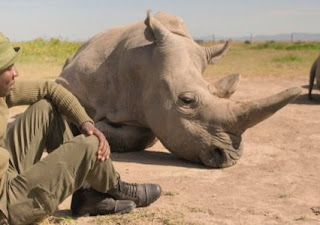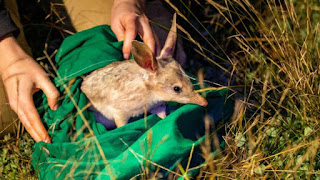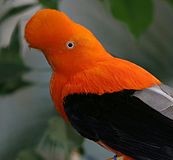Extinction
Sir David
Attenborough makes stark warning about species extinction
By Justin RowlattChief environment
correspondent
Sir David Attenborough returns to
our screens this weekend with a landmark new production.
The tone of the programme is quite different from his usual work. For once Britain's favourite naturalist is not here to celebrate the incredible diversity of life on Earth but to issue us all with a stark warning.
The one-hour film, Extinction: The Facts, will be broadcast on BBC One in the UK on Sunday 13 September at 20:00 BST. "We are facing a crisis", he warns at the start, "and one that has consequences for us all." What follows is a shocking reckoning of the damage our species has wrought on the natural world.
Scenes of destruction
There are stunning images of animals and
plants you would expect from an Attenborough production, but also horrific
scenes of destruction.
In one sequence monkeys leap from trees into a river to escape a huge fire. In another, a koala limps across a road in its vain search for shelter as flames consume the forest around it.
Of the estimated eight million species on
Earth, a million are now threatened with extinction, one expert warns. Since
1970, vertebrate animals - birds, mammals, reptiles, fish, and amphibians -
have declined by 60%, another tells us. We meet the world's last two northern
white rhinos.
These great beasts used to be found in their
thousands in Central Africa but have been pushed to the brink of extinction by
habitat loss and hunting.
"Many people think of extinction being
this imaginary tale told by conservationists," says James Mwenda, the keeper who looks after them, "but I have lived it, I know what it
is."
James strokes and pets the giant animals, but
it becomes clear they represent the last of their kind when he tells us that
Najin and Fatu are mother and daughter.
Species have always come and gone, that's how
evolution works. But, says Sir David, the rate of extinction has been rising
dramatically.
It is reckoned to be now happening at 100 times
the natural evolutionary rate - and is accelerating.
"Over the course of my life, I've encountered some of the world's most remarkable species of animals," says Sir David, in one of the most moving sequences in the film. "Only now do I realise just how lucky I've been - many of these wonders seem set to disappear forever."
Crisis in the natural world
Sir David is at pains to explain that this
isn't just about losing the magnificent creatures he has featured in the
hundreds of programmes he has made in his six decades as a natural history
film-maker.
The loss of pollinating insects could threaten
the food crops we depend on. Trees and other plants regulate water flow and
produce the oxygen we breathe. Meanwhile, the seas are being emptied of fish.
There is now about 5% of trawler-caught fish left compared with before the turn of the 20th century, one expert says. But the pandemic provides perhaps the most immediate example of the risks of our ever-increasing encroachment into the natural world, as we have all been learning in the most brutal fashion over the last six months.
The programme tracks the suspected origins of coronavirus to populations of bats living in cave systems in Yunnan province in China. We see the Chinese "wet market" in Wuhan which specialises in the sale of wild animals for human consumption and is thought to have been linked with many of the early infections.
Cause for hope
The programme is uncompromising in its depiction of the crisis in the natural world, admits Serena Davies, who directed the programme. "Our job is to report the reality the evidence presents," she explains.
But the programme does not leave the audience feeling that all is lost. Sir David makes clear there is still cause for hope. "His aim is not to try and drag the audience into the depths of despair," says Ms Davies, "but to take people on a journey that makes them realise what is driving these issues we can also, solve them."
The programme ends in iconic style. We see one
of the most celebrated moments in all the films Sir David has made in his long
career, the moment he met a band of gorillas in the mountains on the border
between the Democratic Republic of Congo and Rwanda.




Comments
Post a Comment